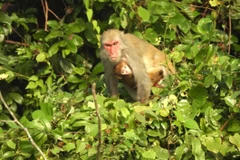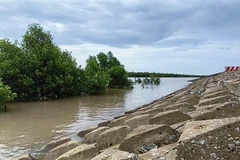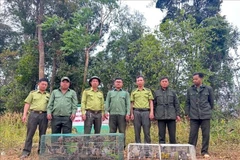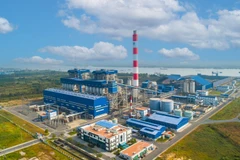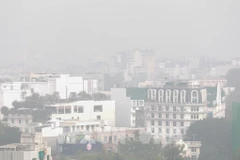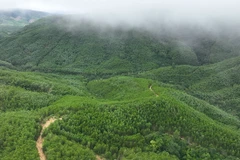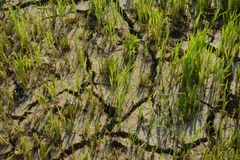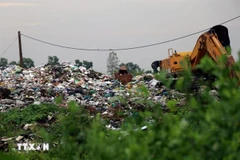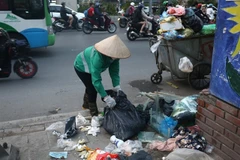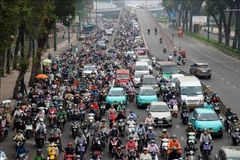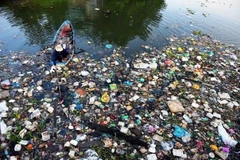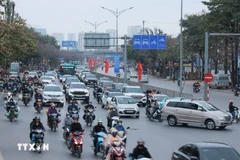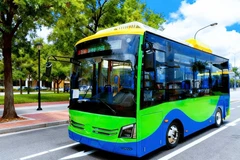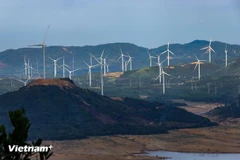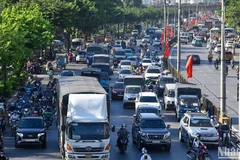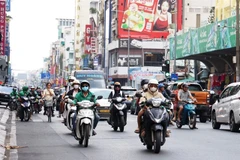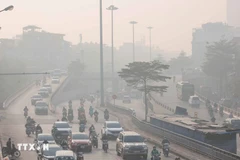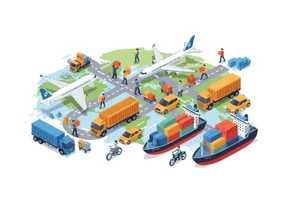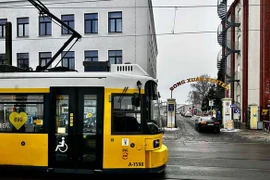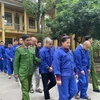Hanoi (VNA) – An ocean clean-up model that engages a fleet of fishing vessels has proved effective in the resort island of Phu Quoc in the Mekong Delta province of Kien Giang.
The island city launched the model called "Fishing fleet against marine plastic waste" last October. It is part of a series of activities to support the implementation of the project "Mitigating Marine Plastic Debris in Vietnam", funded by the German Federal Ministry for the Environment, Nature Conservation and Nuclear Safety via the World Wide Fund for Nature (WWF) Germany. WWF Vietnam has implemented the programme in collaboration with the Vietnam Administration of Seas and Islands (VASI) under the Ministry of Environment and Natural Resources.
Under the pilot model, the fleet of 26 fishing boats not only takes measures to reduce their daily plastic waste disposal but also removes floating plastic debris and abandoned fishing gear from the ocean. The damaged fishing gear will be brought ashore for treatment as regulated. In addition, the crew members must commit to reducing discharged plastic items and be responsible for classifying waste on board.
Each vessel has brought ashore around 160 – 210 kg of waste per trip over the last six months. Some 20% of the amount was recyclable plastics.
A similar model debuted in the central city of Da Nang in late 2021, in which seafarers of fishing vessels have received training from the authority of Tho Quang fishing port on making records on waste disposals and bringing inorganic waste ashore. In the first half of the year, nearly 1,400kg of waste, mostly plastic bottles, plastic bags and aluminium cans, were collected from 4,655 ships.
 The ocean is vulnerable to "white pollution", according to WWF Vietnam. Illustrative image. (Photo: Wired)
The ocean is vulnerable to "white pollution", according to WWF Vietnam. Illustrative image. (Photo: Wired)
Fishery or fishery-related products, such as foam buoys, ropes, small nets, plastic buoys and fishing lines, account for 47% of the total waste item number and 46% of the total waste mass in Vietnam. Illustrative image. (Photo: Reuters)
The "Mitigating Marine Plastic Debris in Vietnam" has also financially supported the implementation of a pilot model for collecting marine litter in Bao Ninh, Dong Hoi city's commune in central Quang Binh province, from October 2021 to March 2022. The research centre piloted the model for sustainable economic and environmental development SEEDS and the communal Women's Union.
Following the model, some 100 fishing vessels collected about 22,500 plastic cans and bottles of various types and 150 – 160kg plastic bags at sea. The collected items were sold to recyclers to raise funds for disadvantaged children and women in Bao Ninh.
The fund had been spent to purchase gift packages to impoverished children, women, and needy fishermen.
Nguyen Dieu Thuy, Director of WWF Vietnam's Plastic Waste Reduction Programme, described these models as small actions with big impacts. They do not only help minimise marine plastic debris and allow enterprises and fishermen to show their responsibility towards the environment, but also bring about socio-economic benefits, she said.
She expected they will serve as lessons for other localities to learn from and continue making changes.
According to WWF Vietnam, the ocean is vulnerable to "white pollution", a term used for the overwhelming discharge of plastic bags or single-use plastic tableware into the environment. Most of the plastic waste is dumped into the ocean by activities associated with the fishery industry.
Fishery or fishery-related products, such as foam buoys, ropes, small nets, plastic buoys and fishing lines, accounted for 47% of the total waste item number and 46% of the total waste mass, according to data from the marine debris monitoring and assessment programme in Vietnam from 2019 – 2021./.







